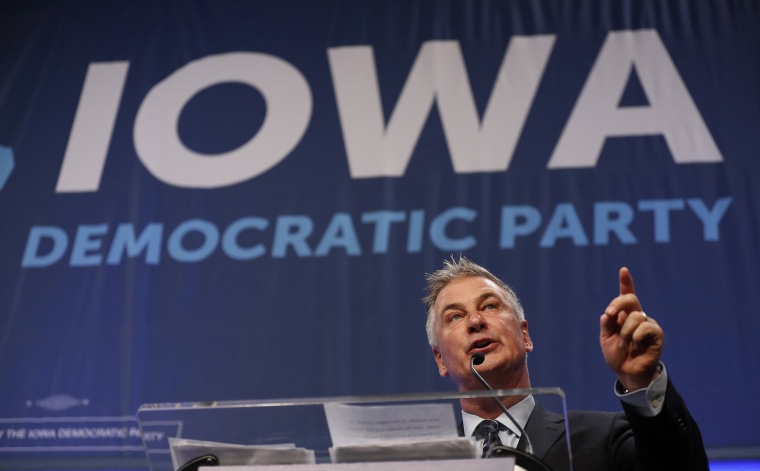DES MOINES — No state holds as vaunted a place in the political firmament as Iowa, home of the quadrennial first-in-the-nation presidential caucuses and, until recently, a closely fought general election battleground.
But the fabled Iowa field of dreams has become something of a nightmare for Democrats.
A year after Hillary Clinton badly lost the state's presidential contest to Donald Trump and Republicans took full control of state government, Democrats are grasping for relevance — with some voicing concern that the state's rightward tilt could imperil its special status in the party's presidential nominating calendar.
"If we don't win the governor's race or take back one part of the legislature in 2018, the question will be, 'Why does this red state get to be first?'" said Matt Paul, a longtime Iowa Democratic strategist who ran Clinton's 2016 caucus campaign in the state.
Iowa's politics have changed markedly from 2008, when Barack Obama's victory in the Democratic caucuses launched his path to the party's presidential nomination that year. Obama went on to win Iowa and its six electoral votes in the general election against Republican rival John McCain, helping to cement Obama's historic win as the nation's first black president. He won Iowa again in his re-election contest against Republican Mitt Romney in 2012.
Since then, Democrats' fortunes have ebbed considerably. Iowa's governor and both U.S. senators are Republican, and Republicans occupy three of the state's four House seats. The GOP took control of both chambers of the state Legislature this year for the first time since 1988. Clinton lost the state by nearly 10 points in 2016, carrying just six of 99 counties as rural Iowans favored Trump by double-digit margins. In some counties that switched to Trump from Obama in 2012, the swing was more than 30 points.
More troubling still for Democrats was a notable enthusiasm shift in 2016: Republicans enjoyed a significant turnout advantage in Iowa compared with 2012, helping contribute to Trump's victory and flipping control of the state Senate to the GOP.
Iowa Democrats point to a litany of challenges as they chart a path forward: crafting a more compelling message; improving the party's standing in rural communities; and jettisoning appeals to individual constituencies in favor of what Democrats describe as broadly shared Iowa values.
"Democrats need to focus on all Iowans. We’re too focused on this group, that group, equality, political buzzwords," said Fred Hubbell, a retired business executive vying for the party's nomination for governor in 2018.
Democrats believe they have a shot in the governor's race, the state's marquee contest ahead of the 2020 presidential crush. The incumbent, Republican Kim Reynolds, was the state's lieutenant governor before succeeding Terry Branstad, who was tapped by Trump to become the ambassador to China last spring. So 2018 will be the first time Reynolds faces voters in her own right.
Trump's presidency has also unleashed a flood of progressive activism in Iowa that was notably lacking during Clinton's presidential run. The 2017 legislative session, which saw successful GOP-led efforts to curtail collective bargaining, establish a 20-week abortion ban, and defund Planned Parenthood, has motivated Democrats across the state to announce plans to run for office.
The actor Alec Baldwin, whose portrayal of Trump on "Saturday Night Live" has elevated his national profile, recently headlined a sold-out fundraiser for the Iowa Democratic Party.
A smattering of likely 2020 Democratic presidential hopefuls have already visited the state or are planning to do so soon.
Vermont Sen. Bernie Sanders, who battled Clinton in the 2016 caucuses, has visited twice this year. A trio of up and coming House Democrats — Reps. Cheri Bustos of Illinois, Tim Ryan of Ohio, and Seth Moulton of Massachusetts — spoke at the fall Steak Fry, a popular event for Democratic activists.
Maryland Rep. John Delaney, who's publicly announced his intent to run for president, has been a frequent presence in Iowa. In August, California Rep. Eric Swalwell, an Iowa native, spoke at the Iowa Wing Ding, another popular event for Democratic activists, along with Jason Kander, who narrowly lost a bid for Senate in Missouri in 2016. Oregon Sen. Jeff Merkley has visited, and New York City Mayor Bill de Blasio is headed to Iowa in December.
All of which, Iowa Democratic Party Chairman Troy Price said, shows the state remains a force to be reckoned with for the national party.
"I completely reject the premise that this is a red state," Price said. "We do a good job winnowing the field of candidates, and this is still a place where candidates can do retail politics. We take our role seriously as the first-in-the-nation state."
